Text
~다 보니(까) <Expressing Realization Pt.1>
[This post features songs by AKMU, ATEEZ, & BTS]
This expression is used to communicate that the speaker has come to a realization after doing something repeatedly or continuously (1). ~다 보니(까) also carries the nuance that the situation (that resulted from the repeated/continuous action) was unintentional or unexpected. This phrase is similar to saying "I realized that" or "before I knew it".
⚠️ The full form of this expression is actually ~다가 보니까, but the "가" is almost always omitted.
Sentence Structure(s)
1. verb + 다 보니(까)
Ex. 주말마다 친구들과 과식을 하다 보니 몸무게가 늘었어요. Every weekend I overate with my friends and now (I realize that) I’ve put on weight.
Ex. 책을 조금씩 읽다 보니 한 권 다 읽었어요. I read the book little by little and now (I’ve found that) I’ve finished the whole thing.
*예문 taken from learnKorean
~다 보니(까), the k-pop way
"정신없이 달리다 보니
어느새 여기까지 왔지"
-from Interlude: Shadow by BTS
Meaning: Having ran so mindlessly, before I knew it, this was where I was.
"저기 밝은 빛을 따라서 가다 보니 we now two"
-from Light by ATEEZ
Meaning: After following that bright light, (I realized that) we now two.
"지친 꿈을 이끌고 계속 걷다 보니
첫발을 함께 떼어 달려왔던
친구들이 곁에 없다는 걸
어느 순간 깨닫게 되지"
-from Will Last Forever by AKMU
Meaning: After walking continuously with tired dreams, I just realized that the friends that were with me in the beginning aren’t with me anymore.
*가사 taken from Color Coded Lyrics
1 note
·
View note
Text
~(으)ㄹ 걸 그랬다
[This post features songs by BIGBANG and iKON]
This phrase is used "for self-reflection and is a way to express regret for not doing something one feels should have been done" (1). This phrase is similar to saying "I should have" or "I would have". When using informal speech, "그랬다" is omitted.
Sentence Structure(s)
1. verb (without 받침) + ㄹ 걸 그랬다
Ex. 시험이 너무 어려워서 시험을 망쳤어요. 이렇게 시험이 어려울 줄 알았으면 공부를 더 많이 할 걸 그랬어요. (The test was so difficult that I failed it. If I had known it would be that hard, I would have studied more.)
Ex. 친구랑 놀러 갔는데 갑자기 비가 왔어. 가지 말걸. (I went out with my friend, but it suddenly rained. I shouldn't have gone out.)
*예문 taken from Self Study Korean
2. verb (with 받침) + 을 걸 그랬다
Ex. 치마를 입고 운동을 하니까 불편하네. 바지를 입을걸. It's uncomfortable to exercise while wearing a skirt. I should have worn pants.
Ex. 친구 생일에 음식을 너무 많이 먹어서 배탈이 났다. 음식을 조금만 먹을 걸 그랬어요.
At my friend's birthday, I ate too much food and got an upset stomach. I should have eaten less food.
*예문 taken from Let’s Study Korean
~(으)ㄹ 걸 그랬다, the k-pop way
"Goodbye goodbye 이별을 알았다면
그토록 사랑하지 말 걸 그랬나 봐요"
-from Goodbye Road by iKON
Meaning: Goodbye. Goodbye. If only I knew we’d say goodbye, I wouldn’t have loved you this much.
"있을 때 잘할 걸 그랬어"
-from IF YOU by BIGBANG
Meaning: I should’ve treated you better when I had you.
*가사 taken from Color Coded Lyrics
**워크시트 taken from Oh My Korean
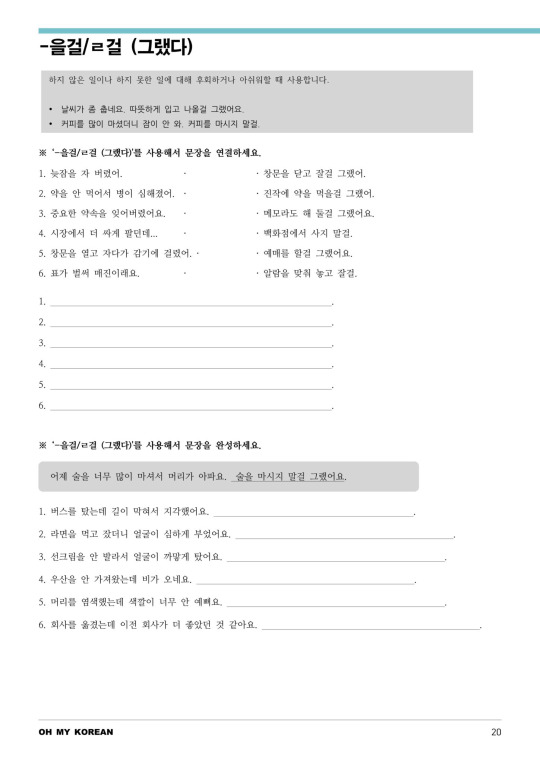
1 note
·
View note
Text
Phrases of the Week #6
호기심을 자극하다: for something to pique your curiosity
자물쇠로 잠긴 상자는 그의 호기심을 자극했다. His curiosity was piqued by the locked box.
그 책은 학생들의 호기심을 자극했다. The book aroused the students' curiosity.
~라고/다고 해도 과언이 아니다: it is not an exaggeration to say…
이제 유튜브가 가장 강력한 마케팅 도구라 해도 과언이 아니다. It is not an exaggeration to say that YouTube is the most powerful marketing tool now.
위기가 임박했다고 해도 과언이 아니다. It is not an overstatement to say a crisis is imminent.
눈 녹듯 사라지다: for a negative emotion to melt away
(lit. to disappear like snow melting)
그를 보자 화났던 것이 눈 녹듯 사라졌다. When I saw him, my anger just melted away.
신이 나서 큰소리로 웃는 동안 이 형제간의 오해는 눈 녹듯 녹아 내리게 된다. While laughing aloud in excitement, all misunderstanding melts away between the brothers.
눈에 아른거리다: for a memory to keep coming back to you, to still "see" something
(lit. to glimmer in your eyes)
그녀는 아기의 방긋거리는 얼굴이 자꾸 눈에 아른거렸다. Memories of the baby's smiling face constantly came back to her.
그 여자의 모습이 내 눈에 아른거리다. Her figure still haunts me.
찬밥 신세가 되다: to be a third wheel, outcast, wallflower
(lit. to be cold rice)
늙고 병들자 그는 집에서 찬밥 신세가 되었다. Aged and diseased, he was a fifth wheel in the family.
공부를 잘하는 형에 비해 공부를 못했던 나는 어렸을 때부터 집에서 찬밥 신세였다. Unlike my older brother, I was not good at studying, and I’d been the outcast of the family since I was young.
찬밥 더운밥 가리다: to be picky
(lit. to distinguish between cold rice and hot rice)
찬밥 더운밥 가릴 때가 아니다. I'm in no position to be picky.
당신은 찬밥 더운밥 가릴 처지가 아니다. Beggars can't be choosers.
티끌 모아 태산: a little goes a long way, many drops make a shower, many a mickle makes a muckle
(lit. gathering dirt to make a big mountain)
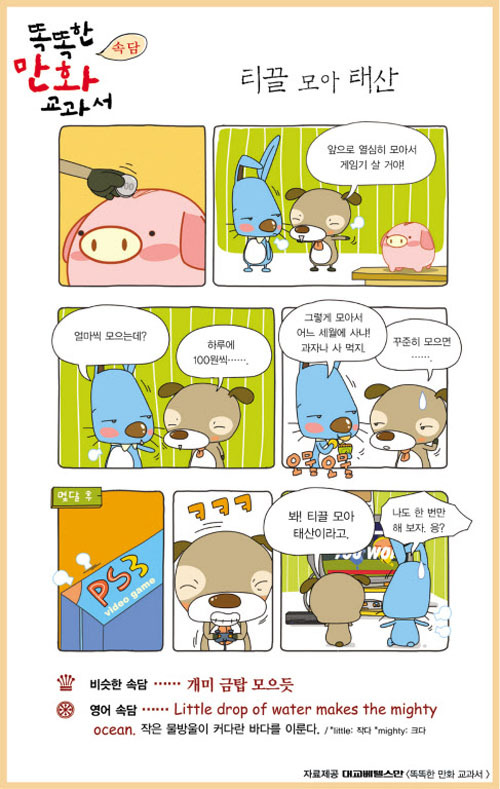
Image source
3 notes
·
View notes
Text
Phrases of the Week #5
우물쭈물할 시간이 없다: there’s no time to lose
서둘러요, 우물쭈물할 시간이 없어요. Please hurry up. There's no time to lose.
순식간에: in the blink of an eye, in an instant
5년이란 세월이 순식간에 흘러갔다. Five years flew by in a flash.
그것은 순식간에 일어난 일이었다. It all happened in an instant.
하는 수 없이: with no other choice, unavoidably
비가 너무 많이 와서 우리는 하는 수 없이 소풍을 취소했다. It rained so hard that we unavoidably canceled the picnic.
하는 수 없이 사실을 털어놓고 말았다. I had no choice but to tell the truth.
이빨을 드러내다: to bare your teeth
개가 이빨을 드러내며 으르렁거렸다. The dog bared its teeth and growled.
어린 사자는 이빨을 드러내고 하품을 했다. The young lion opened its jaws in a teeth-baring yawn.
꼬리를 내리다: to keep a low profile, take a submissive attitude
(lit. to lower your tail)
그 남자는 매니저가 누구의 말도 들으려 하지 않는 걸 보고 꼬리를 내렸다. The man, seeing that the manager wouldn’t listen to anyone, took a submissive attitude.
그는 꼬리를 내리고 기회가 오길 기다렸다. He kept a low profile and waited for the opportunity to present itself.
5 notes
·
View notes
Text
Phrases of the Week #4
~에 눈이 멀다: to be blinded by something
그는 돈에 눈이 멀어 뇌물을 받았다. He was blinded by money and took a bribe.
그는 탐욕에 눈이 멀어 남의 돈을 훔쳤다. He was blinded by greed and stole someone else’s money.
일이 틀어지다: for a situation to go wrong
언제부터 일이 틀어지기 시작했는지 모르겠다. I don't know when it started to go wrong.
걔네가 싸운 뒤론 일이 틀어졌다. Things turned sour after their fight.
안도의 한숨을 내쉬다: to sigh in relief
안도의 한숨을 내쉬며 레스토랑 주차장에 차를 대었다. With a sigh of relief, he pulled into the restaurant parking lot.
그녀는 시험에 통과한 것을 알았을 때 안도의 한숨을 쉬었다. She breathed a sigh of relief when she found out she had passed her exams.
8 notes
·
View notes
Text
~아/어서 그런지
This expression is used to communicate that the speaker is unsure why something happened, but they can guess at its cause. This phrase is similar to saying "maybe because", "I guess it’s because", "or "it’s probably because”.
Sentence Structure(s)
1. adjective + 아/어서 그런지
Ex. 시험 결과가 걱정돼서 그런지 입맛이 없군요.
(I guess I have no appetite because I’m worried about the test results.)
Ex. 여자 친구가 없어서 그런지 심심해하는 것 같아요.
(He seems bored, maybe because his girlfriend isn’t here.)
2. verb + 아/어서 그런지
Ex. 잠을 못 자서 그런지 머리가 아프다.
(I guess I have a headache because I couldn’t sleep.)
Ex. 강아지가 잠들어서 그런지 집이 너무 조용하네요.
(The house is very quiet, maybe because the dog is asleep.)
⚠️ Another form of this expression is ~아/어서 그랬는지, and it can only be used for situations that are in the past and have no bearing on the speaker’s current condition or situation. In other words, to use this expression, the verb at the end of the sentence must also be in past tense.
~아/어서 그런지 vs ~아/어서 그랬는지
비가 와서 그런지 쇼핑을 하고 싶지 않아요.
Maybe because it is raining, I don’t want to go shopping.
비가 와서 그랬는지 쇼핑을 하고 싶지 않았다.
Maybe because it was raining, I didn’t want to go shopping.
*예문들은 Bootstrap Korean Grammar에서 나왔다.
3 notes
·
View notes
Text
Phrases of the Week #3
어중이떠중이: all sorts of people, every Tom, Dick, and Harry
요즘은 어중이떠중이 다 해외여행을 간다. Every Tom, Dick, and Harry travels abroad these days.
어중이떠중이가 다 모였다. Anybody and everybody was at the gathering.
입맛이 달아나다: to lose your appetite
그 얘기를 들으니 입맛이 싹 달아나 버렸다. I’ve lost my appetite after hearing that story.
또 내일 또 회사에 간다고 생각하니까 입맛이 확 달아나네. Thinking about going to work again tomorrow makes me lose my appetite.
입에 오르내리다: to be the talk of the town, gossiped about
(lit. to be on everyone’s lips)
그 소문은 만인의 입에 오르내리고 있다. The rumor is the talk of the town.
미국에서 가장 많이 입에 오르내린 여가수가 첫 앨범을 발매한 지 오랜 시간이 지났습니다. It’s been a long time since the most gossiped about diva in the U.S. released an album.
~에 따라 다르다: to depend on, vary according to
그것은 또한 누구에게 묻느냐에 따라 다르다. It also depends on whom you ask.
운임은 거리에 따라 다르다. The rates vary according to the distance.
긁어 부스럼 만들지 마: don’t go asking for trouble, don’t open a can of worms, let sleeping dogs lie, leave something alone
(lit. don’t scratch your skin and create a boil)
괜히 긁어서 부스럼 만들지 말고 그냥 가만히 있어! Don't go asking for trouble, just relax!
당신은 흐트러진 모습을 보이는 사람들은 주의해야 합니다. 긁어 부스럼을 만들고 싶지는 않겠지요. You should be cautious with people who are upset. You don't want to open Pandora's box.
입이 심심하다: to feel like having a snack, have the munchies
(lit. for your mouth to be bored)
입이 심심한데 뭐 먹을 거 좀 없어요? I feel like having a snack. Don't you have anything to eat?
담배를 끊은 뒤로 나는 입에 간식을 한움큼씩 넣고 있다. 아무래도 입이 심심한 것 같다. Ever since I quit smoking, I've found myself shoveling snacks in my mouth. I guess I've just got the munchies.
8 notes
·
View notes
Text
걸다 vs 달다 vs 널다
Recently, I noticed that Korean has several different words that can all be translated as "to hang" in English but have slightly different connotations.
걸다…
means "to hang a certain object somewhere so as to prevent it from falling" (1). It means to hang something securely so that it doesn’t fall or sway. For example, when you hang a picture on the wall, you hang it securely so that it doesn’t sway or move.
Ex. 모자를 못에 걸다 (To hang a hat on a peg)
Ex. 그림이 하나 벽에 걸려 있다 (The picture is hanging on the wall)
달다…
means to hang something so that it dangles and is not firmly fixed in place (2). For example, when you hang Christmas ornaments they aren’t completely static.
Ex. 어머니는 국경일이면 아침 일찍 대문에 태극기를 다신다 (Whenever it’s a national holiday, my mother hangs a Korean flag on the gate early in the morning)
Ex. 커튼을 달다 (To hang curtains)
널다…
means to hang or spread something out to "[dry] in the sun or wind" (3). This verb is most commonly used to describe hanging clothes out to dry, but it can also be used to describe putting food items (e.g vegetables, fish) out to dry.
Ex. 그녀는 빨래를 널었다 (She hung the laundry out to dry)
Ex. 멍석에 곡식을 널다 (To spread grain out on a straw mat to dry)
Nuance in Action
below you will find the sentence "I hung the flag up" written with each of the verbs above to illustrate how each verb changes the nuance of the sentence
저는 국기를 걸었다.
I hung the flag up (so it wouldn’t fall).
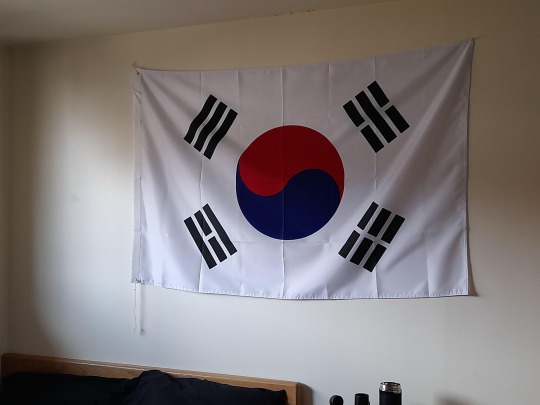
저는 국기를 달았다.
I hung the flag up (so it can dangle).

저는 국기를 널었다.
I hung the flag up (to dry it out in the sun).

*Photos taken from Google
4 notes
·
View notes
Text
Phrases of the Week #2
아직 갈 길이 멀다: to still have a long way to go
우리가 그 프로젝트를��완료하려면 아직 갈 길이 멀다. We still have a long way to go to complete the project.
그들이 차를 살 수 있게 되기엔 아직 갈 길이 멀다. There is still a long way to go before they can buy a car.
마음을 먹다: to be determined, to make up your mind to do something
그녀는 이 새 직장을 잡기로 단단히 마음을 먹고 있다. She’s dead set on getting this new job.
그는 담배를 끊기로 마음을 먹었다. He made up his mind to stop smoking.
자초하다: to bring something upon yourself
그러한 논평은 문제를 자초할 뿐이다. Such comments are just inviting trouble.
네가 자초한 일이야. 불평할 것 없어. You brought it on yourself. Don't complain.
회포를 풀다: to catch up with someone (who you haven’t seen for a while)
(lit. to unburden oneself)
오랜만에 친구들을 만나 회포를 풀었다. I met some friends I hadn't seen in a long while, and we spent some time catching up.
오랜만에 친한 친구를 만나 쌓인 회포를 풀었다. I met up with a close friend that I hadn't seen for a long while and got a lot off my chest.
점수를 따다: to score points with someone, earn brownie points
(lit. to score points, get marks)
걔 사장님 앞에서 점수 따려고 행동하는 것 보면 짜증 나. It's annoying to see him get brownie points in front of the boss.
여자 친구한테 선물을 보내면 점수를 딸 겁니다. You'll score points with your girlfriend if you send her a present.
7 notes
·
View notes
Text
Phrases of the Week #1
발 디딜 틈이 없다: to be crowded, packed
(lit.) no room to place one’s feet
이 음식점은 회사원들이 많이 와서 점심시간에는 발 디딜 틈이 없다. A lot of office workers come to this restaurant, so it’s crowded at lunch time.
출퇴근 시간에 지하철은 발 디딜 틈도 없다. During rush hour, the subway gets jam-packed.
발목을 잡다: for something to hold you back, for something to catch up with you
(lit.) to grab one’s ankle
일이 그의 발목을 잡고 있어서 그는 휴가를 갈 수 없었다. He could not go on a holiday because he was chained to his work.
그녀는 언젠가는 자신의 과거 문제들이 결국 자기 발목을 잡게 될 거라고 두려워했다. She was terrified that one day her past problems would catch up with her.
입에 게거품을 물다: to foam at the mouth (in anger)
내가 돈을 더 달라고 하자 그는 입에 게거품을 물었다. He frothed at the mouth when I asked for more money.
그가 나에게 욕을 하기 시작하며 입에 게거품을 물었다. He started swearing at me and was foaming at the mouth.
12 notes
·
View notes
Text
~아/어 대다
대다 is a 보조 동사 used to "indicate the repetition of an action […] or that the level of the action is extreme" (1). It is mainly used to describe repeated actions/habits in a negative light and "shouldn’t be used [in] polite or formal situations" (2). This phrase is similar to saying someone "keeps doing" or is "always doing" something to the point that it is excessive or bothersome.
Sentence Structure(s)
1. verb + 아/어 대다
Ex. 아내는 항상 아이들에게 깨끗이 씻으라고 잔소리를 해 댄다.
(My wife is always nagging the children to wash up properly.)
Ex. 유민이가 자꾸 밥은 안 먹고 햄버거를 사 달라고 졸라 대서 곤란해 죽겠어요.
(Yu-min keeps refusing to eat and begging me to buy her a hamburger, so I’m at my wit’s end.)
Ex. 지수는 입만 열면 거짓말을 해 대니 믿을 수가 없다.
(I can't believe anything Ji-soo says because she lies whenever she opens her mouth.)
*예문들은 한국어기초사전에서 왔어요.
5 notes
·
View notes
Text
To anyone interested in hanja, I found a Korean dictionary app that shows the corresponding hanja for any word you are searching. It’s called…
Dusajeon
Features:
1. Definitions are available in English, Korean, Japanese, and Chinese.
2. Each definition has several sample sentences.
3. Each hanja character has its own page with examples of words it is found in.
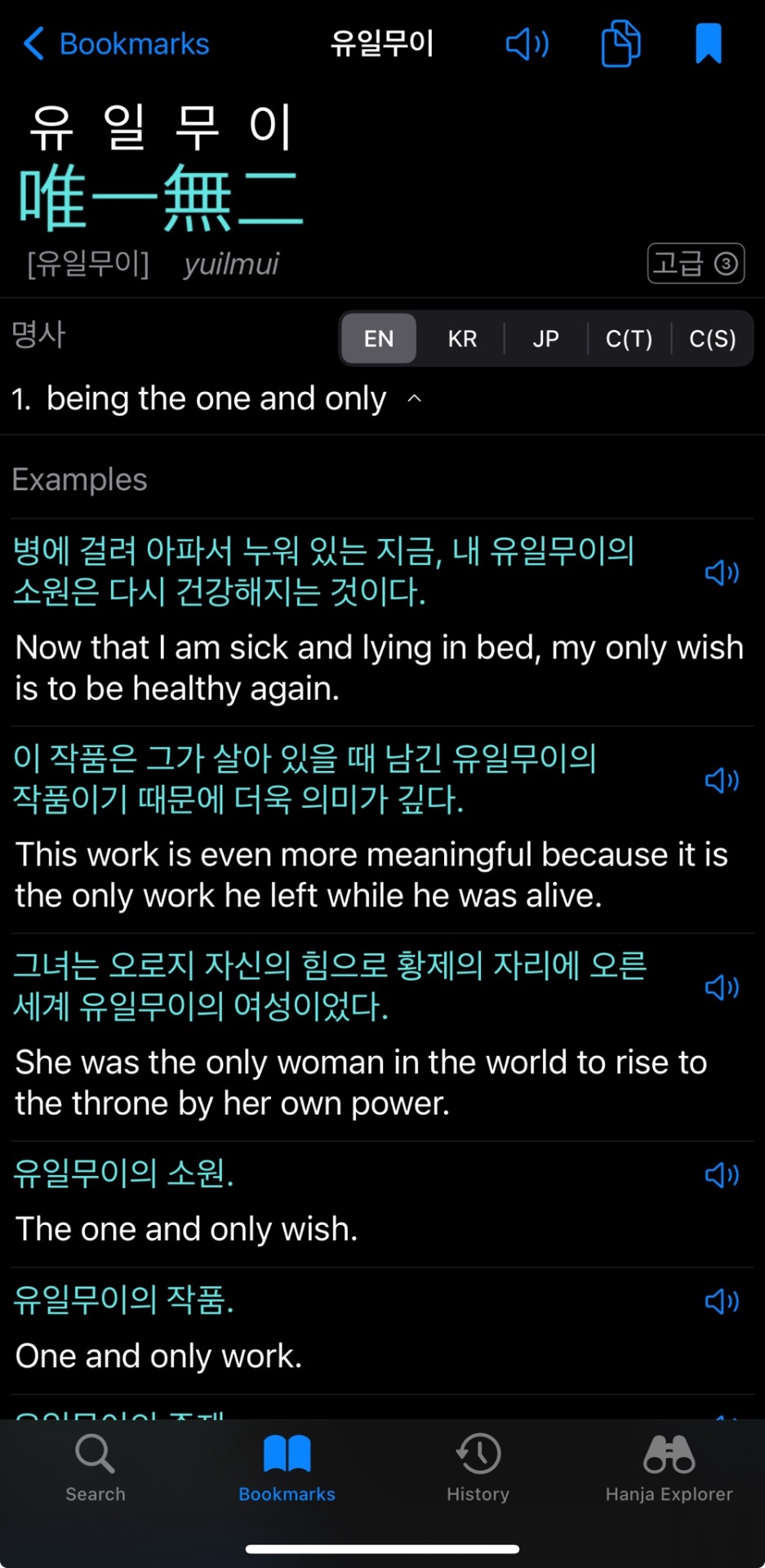
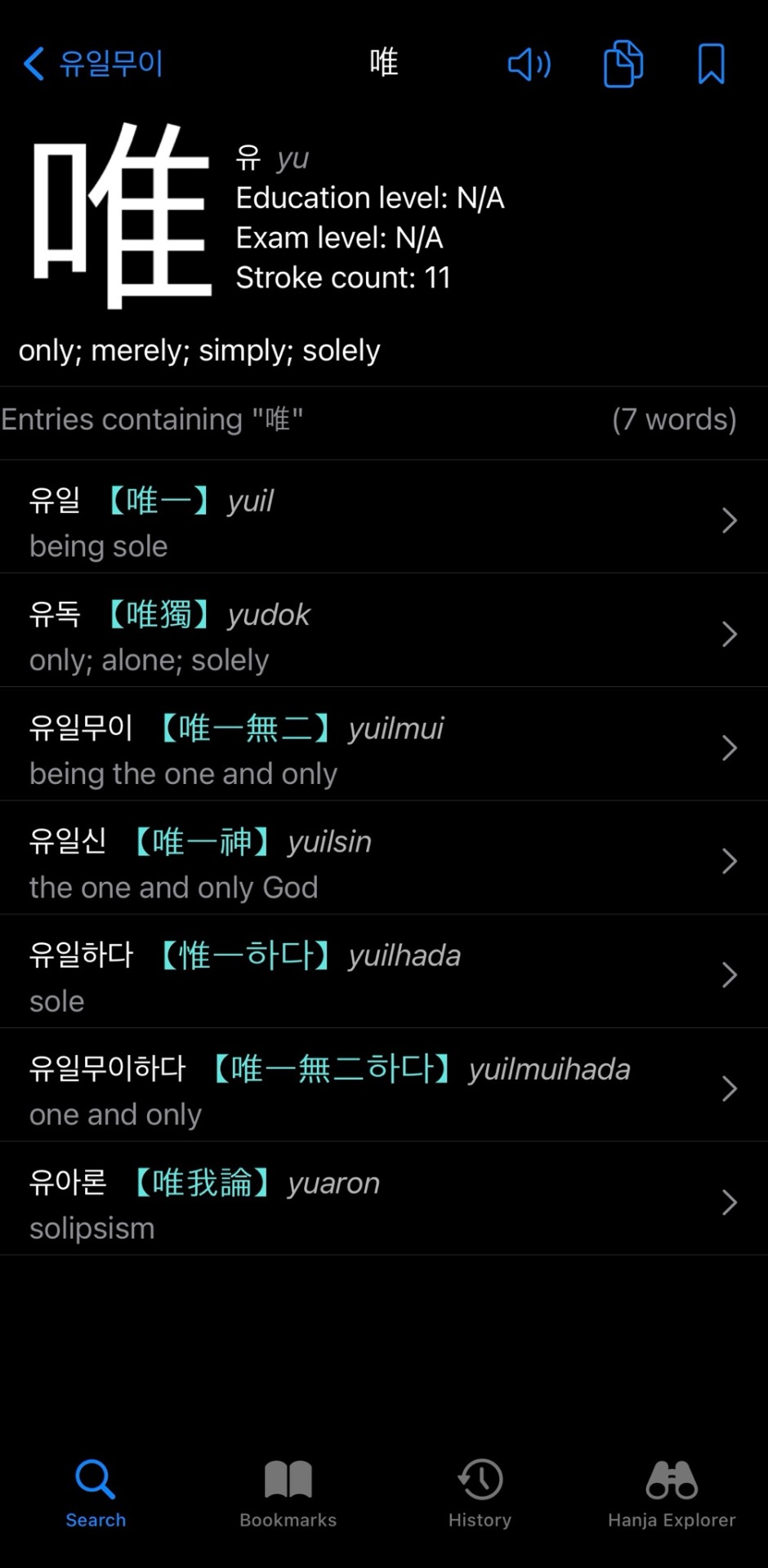
4. Hanja characters are categorized by exam level, frequency, and stroke count. (I find the frequency category most useful since it helps you prioritize learning the hanja characters that are most common.)

That’s all for now. Happy studying! 👋🏾
5 notes
·
View notes
Text
보다 vs 시청하다 vs 관람하다
Just like in any language, there are many words in Korean that in essence mean the same thing but have specific nuances that differentiate them from each other.
So, today I’d like to talk about the difference between 보다, 시청하다, and 관람하다, which all mean "to watch".
시청하다…
means "to watch a television broadcast" (1) and has the nuance that the viewer is watching a recorded video and is not watching something at a public venue or in real time.
Ex. 넷플릭스를 시청하고 나면 스트레스가 풀린다. (I feel relaxed after watching Netflix.)
Ex. 지난번에 A팀 경기 시청했니? (Did you catch team A's game the other day?)
관람하다…
means "to watch/see performances, movies, sports games, or exhibits" (2) and means that someone is viewing something in a public space in real time.
Ex. 사람들이 스포츠 경기를 관람하고 있다. (People are attending a sporting event.)
Ex. 나는 여동생들을 데리고 연극 관람을 갔다. (I took my younger sisters to see a play.)
보다…
has several different meanings in Korean, but it is often used to mean "to watch" (3). Unlike 시청하다 and 관람하다, 보다 can be used to describe watching anything at all since it does not imply where the watching is happening or what is being watched.
Ex. 그 밴드의 공연을 보기 위해 수천 명의 사람들이 많은비싼 돈을 지불했다. (Thousands of people paid good money to watch the band perform.)
Ex. 난 텔레비전 보고 싶지 않아. (I don’t want to watch TV.)
⚠️ 보다 can be used in place of both 시청하다 and 관람하다, but 시청하다 and 관람하다 are not interchangeable.
Nuance in Action:
below you will find the sentence "last weekend, I watched a baseball game" written with each of the verbs above to illustrate how using each verb changes the nuance of the sentence
지난 주말에 야구 경기를 봤어요.
Last weekend, I watched the baseball game.
지난 주말에 야구 경기를 시청했어요.
Last weekend, I watched the baseball game (on TV or some other electronic device).
지난 주말에 야구 경기를 관람했어요.
Last weekend, I watched the baseball game (in person at the stadium).
16 notes
·
View notes
Text
~(으)ㄴ/는 김에
The clause ~(으)ㄴ/는 김에 is used when the action preceding it gives someone the opportunity to do, or creates the conditions for, the subsequent action. In other words, the first action makes the second action more convenient. This phrase is similar to saying "while you’re at it" or "since you’re already [insert action here]ing".
Sentence Structure(s)
1. (present tense) verb + 는 김에
Ex. 약국에 가는 김에 치약을 사 주세요. (Since you’re going to the pharmacy, can you please buy me some toothpaste while you’re at it?)
2. (past tense) verb + (으)ㄴ 김에
Ex. 샐러드를 만든 김에 야채수프도 만들었어요. (While I was making a salad, I (took the opportunity and) made vegetable soup as well.)
Ex. 말이 나온 김에 여행예약을 하자. (Speaking of which, let’s (take this opportunity to) make our travel reservations.)
*예문은 learnKorean에서 나왔어요
5 notes
·
View notes
Text
Korean Transition Words
Here are some transition type words I’ve encountered during my reading that make sentences so much more interesting. Enjoy! ☺️
게다가: plus, besides, in addition, moreover
- 넌 틀렸어. 게다가 넌 그걸 알고 있어! (You’re wrong, and what’s more you know it!)
- 꼭 가고 싶은 건 아냐. 게다가 이제 시간도 너무 늦었어. (I don’t really want to go. Besides, it’s too late now.)
- 재능 있는 화가인 그는 게다가 꽤 저명한 작가이기도 했다. (A talented artist, he was, moreover, a writer of some note.)
그래서: so, therefore, thus, for that reason
- 그가 아주 조용해졌다. 그래서 나는 그의 심기가 불편해졌다는 것을 알았다. (He went very quiet, so I knew he was upset.)
- 그가 그녀를 거짓말쟁이라고 했고, 그래서 그녀가 나가 버렸다. (He told her she was a liar, whereupon she walked out.)
- 작년에 재료값이 급등했습니다. 그래서 저희가 가격을 올릴 수밖에 없었습니다. (The cost of materials rose sharply last year. Accordingly, we were forced to increase our prices.)
그러고 보니: come to think of it, actually
- 그러고 보니, 그가 당신을 만났다는 말을 했어요. (Come to think of it, he did mention seeing you.)
- 그러고 보니 얼굴이 좀 창백해 보이네요. 오늘 집에 일찍 들어가서 자요. (Actually, you do look a little pale. Maybe you should go home early today and go to bed.)
- 그러고 보니… 그렇네. (Yeah… You're right.)
그런데: by the way, but, however
- 그런데, 네가 찾고 있던 그 책 내가 찾았어. (By the way, I found that book you were looking for.)
- 우리는 온 데를 다 뒤져 보았지만 그런데도 그것을 찾을 수가 없었다. (We searched everywhere but we still couldn’t find it.)
- 그런데 책상 3개가 손상되어 있었습니다. (However, three of the desks were damaged.)
그렇다면: if so, in that case, then
- “난 결심했어.” “그렇다면 논의할 필요가 없군." (‘I’ve made up my mind.’ ‘In that case, there’s no point discussing it.’)
- 그렇다면 문제가 없으리라 봅니다. (Then, I think there's no problem.)
- 그렇다면, 어디에 선을 그어야 하는가? (If so, how do we decide where to draw the line?)
그 당시에: at that time, then
- 그 당시에는 그 산업이 허우적거릴 때였다. (At that time the industry was floundering.)
- 그 당시엔 해외여행은 꿈도 못 꾸었다. (People could not even dream of traveling abroad in those days.)
- 그 당시에 나는 6개월째 일자리를 찾고 있었다. (At that time I had been job-hunting for six months.)
아니나 다를까: sure enough, as expected
- 아니나 다를까 버스가 제 시간에 오지 않았다. (The bus didn't come on time, just as expected.)
- 아니나 다를까 그 계획은 실패했다. (Unsurprisingly, the plan failed.)
- 그녀가 그는 또 약속을 어길 거라더니 아니나 다를까 그랬다. (She said he'd break his promise again, and sure enough he did.)
예를 들면: for example
- 예를 들면, '다시 말해서', '그래서', '하지만' 등이 연결 어구입니다. (For example, 'in other words', 'so', and 'but' are cohesive devices.)
- 예를 들면 우리는 진실을 말하거나 거짓을 말할 수도 있다. (For instance, we can either tell the truth or tell a lie.)
- 예를 들면, 세균들은 문, 버스 좌석, 학교 책상 위에 산다. (For example, germs live on doors, bus seats, and school desks.)
혹시나 싶어서 / 혹시나 해서: just in case, just to be sure
- 그리고 또 혹시나 싶어서 손도 자주 씻고. (And just in case, I'll wash my hands often.)
- 그래서 혹시나 해서 영어사전을 한 번 찾아봤습니다. (So, I looked for an English dictionary just in case.)
- 집을 사려고 계약하기 전에 혹시나 싶어 등기부 등본을 떼어 보니 집 주인의 명의가 달랐다. (Before signing the contract to buy the house, I removed a copy of the register just in case, and the name of the owner of the house was different.)
*예문들은 Naver Dictionary에서 왔어요
8 notes
·
View notes
Text
Phrases using 눈
눈을 감다: to close one’s eyes
눈을 뜨다: to open one’s eyes
눈을 내리깔다: to lower one’s eyes
눈을 비비다: to rub one’s eyes
눈을 가리다: to cover one’s eyes
눈을 깜박거리다: to blink
눈이 멀다: to be/become blind
눈이 맵다: for one’s eyes to burn
눈이 휘둥그래지다: for one’s eyes to widen
눈이 낮다: to have low expectations/standards
눈이 높다: to have high expectations/standards
예문
그녀는 눈을 감고 숨을 깊이 들이마셨다. (She closed her eyes and inhaled deeply.)
그가 눈을 뜨자 방이 빙글빙글 도는 것 같았다. (When he opened his eyes, the room was reeling.)
그녀는 계속 눈을 내리깔고 있었다. (She kept her eyes lowered.)
그는 눈을 비비고 하품을 했다. (He rubbed his eyes and yawned.)
그녀가 햇살을 피해 눈을 가렸다. (She shaded her eyes against the sun.)
그녀는 용감하게 눈을 깜박거리며 눈물을 참았다. (She bravely blinked back her tears.)
의사들은 그가 눈이 멀게 될 것이라고 생각한다. (Doctors think he will go blind.)
선블록 로션이 눈에 들어가서 눈이 맵다. (My eyes are burning after getting sun lotion in them.)
그녀의 두 눈이 놀라서 휘둥그레졌다. (Her eyes widened in surprise.)
내가 눈이 낮은 것인지 몰라도 비싼 옷이 꼭 좋다고 생각되지 않는다. (I may have low expectations, but I don't think expensive clothes are necessarily good.)
그는 여자친구가 없다고 불평하지만, 사실은 눈이 너무 높다. (He complains about being single, but he has such high standards.)
*예문들은 Naver Dictionary에서 왔어요
16 notes
·
View notes
Text
~지 뭐
[This post features songs by HyunA and TREI]
~지 뭐 is used communicate that one is resigned to their circumstances. In other words, the situation can’t be changed or is unavoidable, so the speaker doesn’t care about the outcome anymore.
⚠️ You can make this statement polite by using ~지요 뭐
Sentence Structure(s)
1. verb + 지 뭐
Ex. 어쩔 수 없지 뭐
(Oh, well.)
Ex. 안된 일이긴 하지만 어쩔 수 없는 일이지 뭐
(Too bad, but it's just one of those things.)
Ex. 완벽한 남자랑 결혼하는 것이 그냥 환상이지 뭐.
(I guess I just need to resign myself to the fact that marrying the perfect man is just a fantasy.)
Ex. 일주일 동안 머무르면 좋겠는데 호텔이 없으니까 나흘간만 가지 뭐.
(It would have been nice to have gone for a week, but there are no hotels, so I guess we’ll just have to go for four days.)
*예문 taken from How to Study Korean and NAVER Dictionary
~지 뭐, the k-pop way
"이게 다 내가 잘나가서 그렇지 뭐
내가 예뻐서 그렇지 뭐"
-from Roll Deep by HyunA (feat. Ilhoon of BTOB)
Meaning: It’s all because I’m the best. It’s all because I’m pretty.
"요즘 내 하루는 길어 외로워 의미 없지 뭐"
-from Gravity by TREI
Meaning: My days are long, lonely, and meaningless.
3 notes
·
View notes